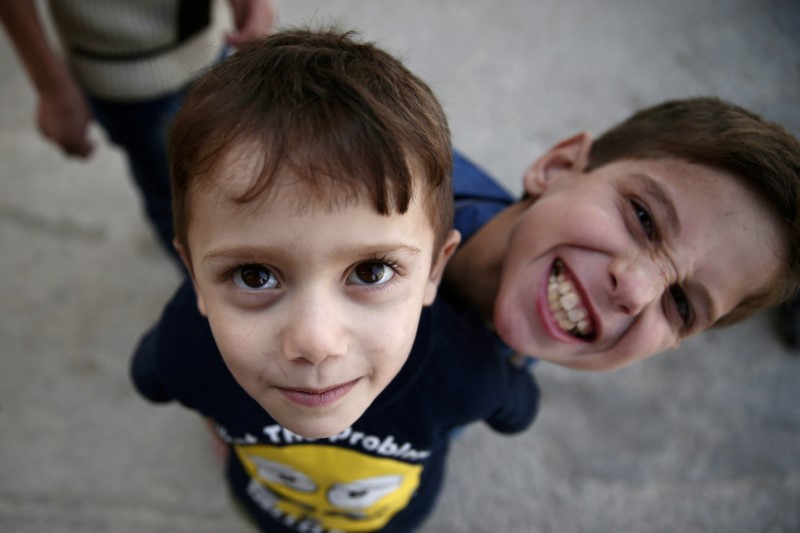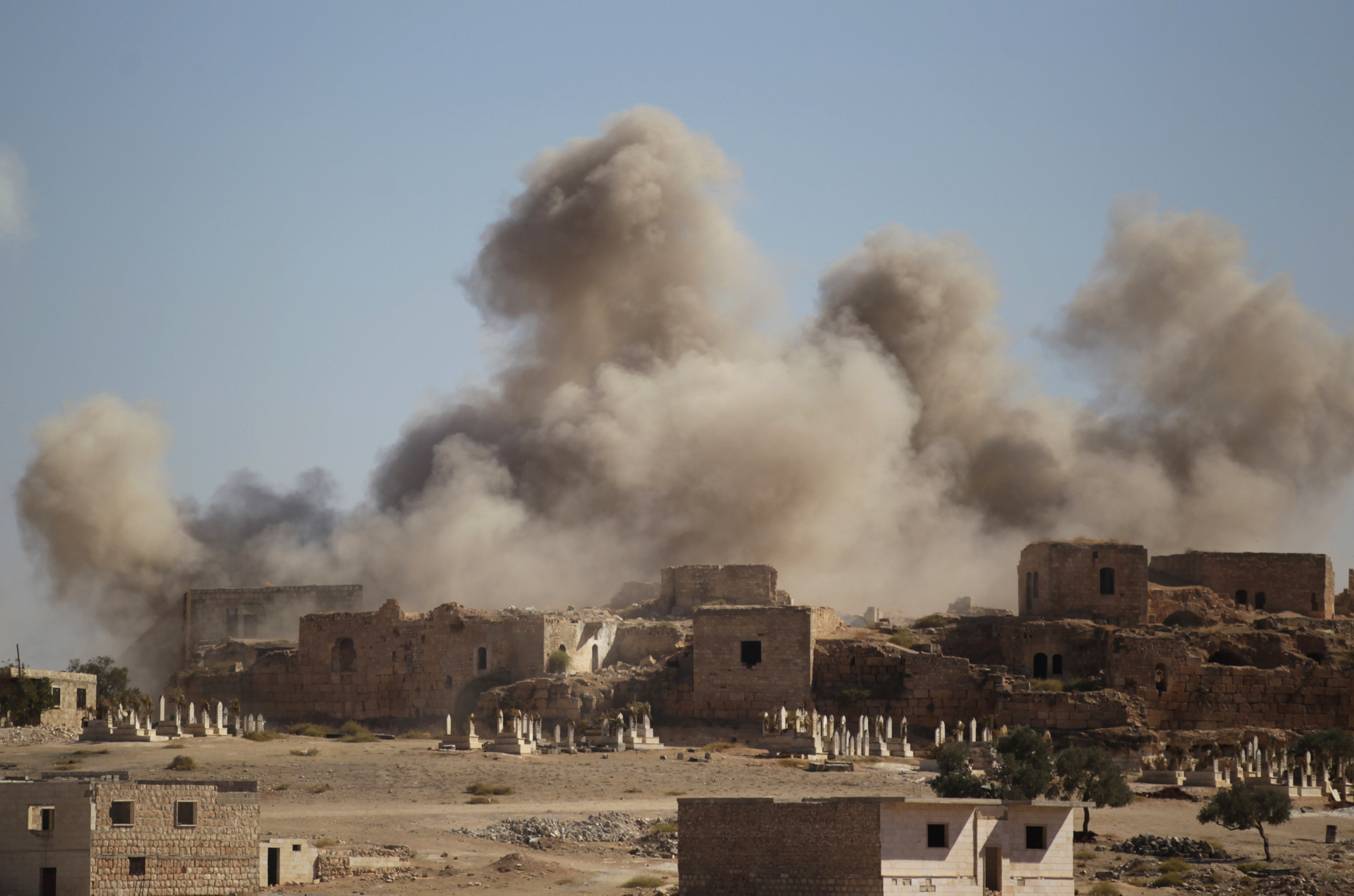
By Michelle Nichols and Suleiman Al-Khalidi
UNITED NATIONS/AMMAN (Reuters) – The United States accused Russia of “barbarism” in Syria on Sunday as warplanes supporting Syrian government forces pounded Aleppo and Moscow said ending the civil war was almost “impossible”.
A diplomatic solution to the fighting looked unlikely as U.S. and Russian diplomats disagreed at a U.N. Security Council meeting called to discuss the violence, which has escalated since a ceasefire collapsed last week.
Rebels, who are battling President Bashar al-Assad’s forces for control of Aleppo, said any peace process would be futile unless the “scorched earth bombing” stopped immediately.
Capturing the rebel-held half of Syria’s largest city, where more than 250,000 civilians are trapped, would be the biggest victory of the civil war for Assad’s forces.
They have achieved their strongest position in years thanks to Russian and Iranian support and launched a fresh offensive for a decisive battlefield victory on Thursday. Residents and rebels say thousands have been killed in the new strikes.
“What Russia is sponsoring and doing is not counter terrorism, it is barbarism,” U.S. Ambassador to the United Nations, Samantha Power, told the 15-member council.
“Instead of pursuing peace, Russia and Assad make war. Instead of helping get lifesaving aid to civilians, Russia and Assad are bombing the humanitarian convoys, hospitals, and first responders who are trying desperately to keep people alive.”
The French and British foreign ministers also took aim at Russia, saying it could be guilty of war crimes.
But Russia defended its position.
“In Syria hundreds of armed groups are being armed, the territory of the country is being bombed indiscriminately and bringing a peace is almost an impossible task now because of this,” Russian U.N. Ambassador Vitaly Churkin told the council.
SCORCHED EARTH
In the first major advance of the new offensive, Syrian forces seized control of the Handarat Palestinian refugee camp, north of Aleppo.
Rebels counter attacked and said on Sunday they had retaken the camp before the bombing started.
“We retook the camp, but the regime burnt it with phosphorous bombs,” said Abu al-Hassanien, a commander in a rebel operations room that includes the main brigades fighting to repel the army assault.
The army, which is also being helped by Iranian-backed militias, Lebanon’s Shi’ite Hezbollah militant group and a Palestinian militia, acknowledged rebels had retaken Handarat.
“The Syrian army is targeting the armed groups’ positions in Handarat camp,” a military source was quoted on state media as saying.
Planes continued to pound residential areas on Sunday, flattening buildings, rebels and residents said.
“The Assad regime and with direct participation of its ally Russia and Iranian militias has escalated its criminal and vicious attack on our people in Aleppo employing a scorched earth policy to destroy the city and uproot its people,” a statement signed by 30 mainstream rebel groups said on Sunday.
The Syrian Observatory for Human Rights, a monitoring group, said at least 45 people, among them 10 children, were killed in eastern Aleppo on Saturday.

Boys pose while playing in the rebel-held Douma neighbourhood of Damascus, Syria September 25, 2016. REUTERS/Bassam Khabieh
The army says it is targeting only militants.
Hundreds of thousands of people have been killed in the civil war and 11 million driven from their homes.
DIPLOMATIC EFFORTS
Russia and the United States agreed on Sept. 9 a deal to put the peace process back on track. It included a nationwide truce and improved humanitarian aid access but it collapsed when an aid convoy was bombed killing some 20 people.
U.S. Secretary of State John Kerry, who hammered out the truce in months of intensive diplomacy, pleaded with Russia to halt air strikes.
U.N. Syria mediator Staffan de Mistura appealed to the Council meeting to come up with a way to enforce a ceasefire.
“I am still convinced that we can turn the course of events,” he said, adding that he would not quit trying to bring peace in Syria.
However, Russia is one of five veto powers on the council, along with the United States, France, Britain and China. Russia and China have protected Assad’s government by blocking several attempts at council action.
British Foreign Secretary Boris Johnson said Russia was guilty of prolonging the war in Syria and may have committed war crimes by targeting an aid convoy.
“We should be looking at whether or not that targeting is done in the knowledge that those are wholly innocent civilian targets, that is a war crime,” he said in a BBC interview aired on Sunday.
The rebels said they could not accept Russia as a sponsor of any new peace initiative “because it was a partner with the regime in its crimes against our people”.
It said Russian-backed Syrian forces were using napalm and chemical weapons without censure from the international community.

Smoke rises behind the ancient castle of the rebel-controlled town of Maaret al-Numan after airstrikes in Idlib province, Syria, September 25, 2016. REUTERS/Khalil Ashawi
U.N. investigators are looking into the alleged use of the incendiary weapons phosphorus and napalm in several cities.
The war has ground on for nearly six years, drawing in world powers and regional states. Islamic State – the enemy of every other party to the conflict – has seized swathes of Syria and neighboring Iraq.
World powers appeared to believe that neither Assad nor his opponents were capable of decisive victory on the battlefield.
But Russia’s apparent decision to abandon the latest peace process could signal it now thinks that victory is in reach, at least in the western cities where the majority of Syrians live.
Assad’s fortunes improved a year ago when Russia joined the war on his side. Since then, Washington has worked hard to negotiate peace with Moscow, producing two ceasefires. But both proved short-lived, with Assad showing no sign of compromise.
Outside Aleppo, anti-Assad fighters have been driven mostly into rural areas. Nevertheless, they remain a potent fighting force, which they demonstrated with an advance of their own on Saturday.
(Additional reporting by Yara Bayoumy in New York; Writing by Anna Willard; Editing by Alison Williams and Adrian Croft)











